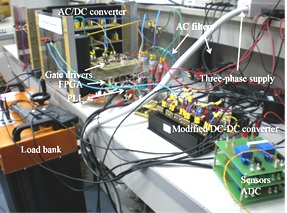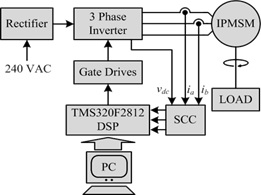SMART POWER CONVERSION SYSTEM |
CASCADED MULTILEVEL INVERTER BASED ON TRANSISTOR-CLAMPED H-BRIDGE POWERCELL |
|
The cascaded multilevel inverter uses 5-level transistor-clamped H-bridge (TCHB) power cell.Two-cell configuration can produce up to 17 levels of line voltage, sufficient to produce a high-quality output.Total power loss is lower compared to other conventional cascaded multilevel inverters (i.e. cascaded NPC and 9-level CHB) that produce the same output quality at the same operating voltage owing to lower component counts.
The inverter is potential for use in medium-voltage applications (e.g. electric drives in heavy industries, ship propulsion, electric train as well as flexible ac transmission system (FACTS) devices – STATCOM, DVR, etc.). |
MODIFIED THREE-PHASE AC/DC CONVERTER WITH CASCADED BOOST-SEPIC OUTPUT STAGE |

A modified three-phase buck rectifier with cascaded boost-SEPIC converter at the output stage operates in continuous-conduction mode (CCM), and its purpose is to achieve sinusoidal input currents with low current total harmonic distortion (THD), near-unity power factor, and high DC voltage gain during low duty cycle operation. Altera field-programmable gate array (FPGA) is used to generate pulse-width modulated (PWM) control signals, and to compute Proportional-Integral-Derivative (PID) algorithm. |
MOTOR AND DRIVES |
SENSORLESS VECTOR CONTROL DRIVES FOR INTERIOR PERMANENT MAGNET SYNCHRONOUS MOTOR BASED ON SIMPLIFIED STATOR FLUX OBSERVER |

This research focuses on the implementation of sensorless closed-loop field oriented control (FOC) drives system using simplified stator flux observer (SFO) in TMS320F2812 digital signal processor (DSP) platform. The overall performance of the drive system is observed and tested using a 600W, 4 poles IPMSM at different speed reference, constant load condition. |
SMART TRANSPORTATION SYSTEM |
OPERATION OF A SIX-PHASE INDUCTION MACHINE WITH SERIES-CONNECTED CONVERTERS |
|
Compared with conventional parallel-connection, the topology with series-connected converter provides the following advantages:
|
AUTOMATION AND CONTROL |
DISTRIBUTED COLLISION AVOIDANCE ALGORITHMS FOR AUTONOMOUS UNMANNED AIRCRAFT |
|
Novel distributed CAS algorithms have been proposed supporting UAV free-flight concept. This work focused on CAS development and verification. Avoidance is formulated by finding the optimal control commands that minimize multi-level cost functions, considering UAV safety & trajectory deviation efficiency. Experiments conducted conclude that the proposed CAS guarantees safety, operates in real-time and is efficient in terms of flight-path length deviation.
|
Last Update: 19/06/2023